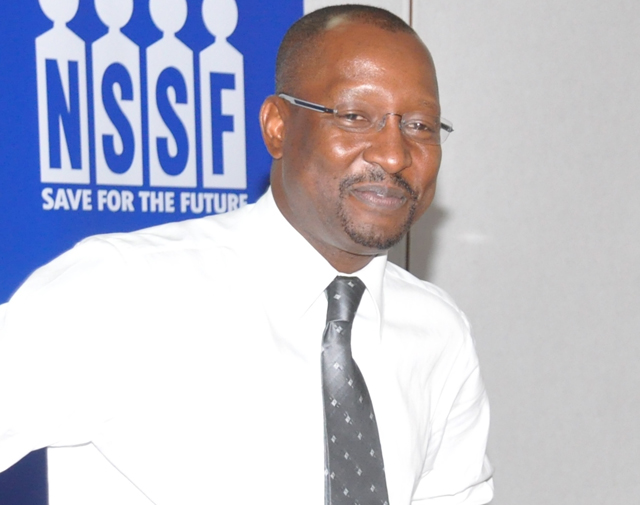NSSF Uganda has narrowed the gap with top fund managers of similar size in investment performance
at the global stage, shows industry data released by the Annual CEM Investment Benchmarking survey, commissioned by the International Social Security Association (ISSA).
According to the reputable investment benchmark survey’s 27th edition, NSSF beat other saving bodies in net total return, net value added and investment cost.
The survey, conducted worldwide and report issued last month was to determine the competitiveness of pension and social security funds on a global scale based on international standards on a peer-to-peer basis, elaborated Nabweteme Sharon, Public Relations Officer at NSSF Uganda.
The Fund was benchmarked in a category that included 310 pension funds, with asset sizes ranging from the equivalent of UGX 2 trillion to UGX 7 trillion based on the financial results for the Financial Year 2015/2016.
With Richard Byarugaba at the helm, in Net Total Return, the Fund’s return was 11.8%, which is above the global median return of 7.6%, for Net Value Added NSSF’s net value added was 9.8%, above the global median of 0.0% and on Investment Cost the state utility’s total investment cost was 7.0 bps (0.07%), which is below the global median of 49.4 bps (0.494%).
The investment cost is comprised of asset management fees and costs plus oversight, custodial and other costs. It excludes transaction costs, private asset performance fees and non-investment pension costs such as actuarial costs and benefit administration.
NSSF Deputy Managing Director Mr Patrick Ayota said that the report offers an internationally recognised benchmark on which the Fund can compare its performance on an international scale against other pension funds with similar size globally.
“I am pleased to announce that on all aspects, the Fund performed much better than its peers. A comparison of our investment returns, value added and costs to the global universe shows that we are not only competitive but we outperformed all global funds of our size. This is a vindication of our aggressive but prudent investment strategy we have implemented over the last seven years,” he said.
Of the 310 pension and social security funds that were considered by CEM Benchmarking for the study, 144 are corporate, 120 are public funds while 46 are categorised as other.

CEM Benchmarking is a global and independent pension research firm serving over 350 blue-chip corporate and government entities worldwide. It also provides objective and actionable information for large pools of capital including pension funds, endowments/foundations and sovereign wealth funds.
“This study went further to show that our costs are actually low compared to global funds of our size. This is because even when adjusting for differences in fund size, asset mix and country of origin of all the funds that were involved in the study, our total investment cost of 7.0 bps was below thebenchmark cost of 79.5 bps.”
“This means that we are creating more value for our members at a much lower cost. I would like to applaud our in-house Investments team for the exemplary performance on the investment front. The challenge now before us is to continue to deliver real value to our members,” Ayota added.
The Fund paid 11.23% interest rate on members’ savings for the financial year 2016/2017, following good financial performance that saw the earnings grow by 35% from Shs674 billion in 2016 to Shs912 billion in 2017.
The Fund’s performance also improved- total contributions grew by 17% from Shs785.5 billion in 2016 to Shs917billion in 2017 (monthly contributions grew by 18.5% from Shs65 billion to Shs77 billion) as compliance improved from 77% to 80% and the number of employers and members registered, grew by 14% and 9% respectively.
The Fund recorded a 20% growth of assets under management from Shs6.586 billion in 2016 to Shs7.924 billion as at June 30, 2017, keeping NSSF as Uganda’s largest financial institution.

The NSSF uses members fund to make investments on their behalf in government securities (treasury bonds and treasury bills), it also invests members funds in equities listed on the stock exchange and real estates.










